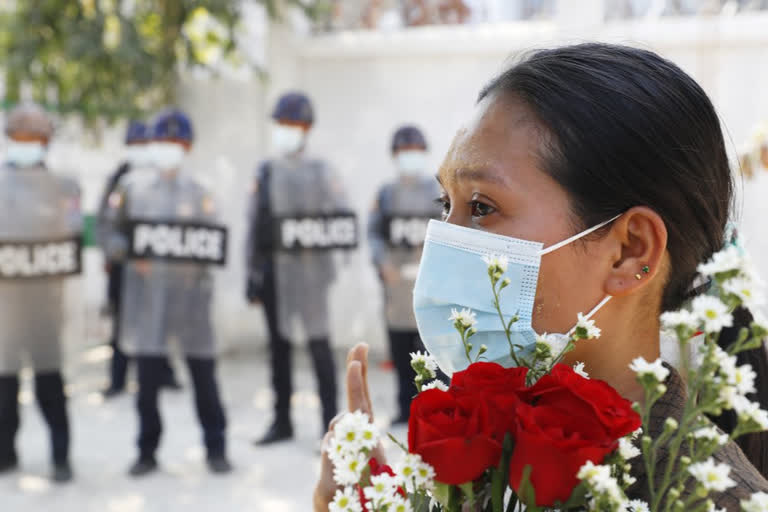Yangon: Hundreds of members of Myanmar’s deposed ruling party declared themselves on Friday to be the sole legitimate representatives of the people and asked for international recognition as the country’s government, as protests against the military takeover swelled.
In a letter to the United Nations and the international community posted on social media, the party also asked for targeted sanctions and for businesses to cut ties with the military, which has vast lucrative holdings.
The party promised to act “in the best interests of our people and the very essence of democracy.”
The lawmakers had been set to take their seats Monday in a new session of Parliament when the military announced it was taking power for a year and detained them, though most have since been released. It was not clear what, if any, practical effect the lawmakers’ declaration would have. Several countries have already denounced the coup, and the U.S. has threatened new sanctions.
Resistance has been gathering steam ever since the takeover — seen internationally as a shocking setback in the Southeast Asian country, which had been making significant if uneven progress, toward democracy after decades of military rule. Military pushback is ramping up as well, and the latest politician detained was Win Htein, a senior member of Suu Kyi’s party. Suu Kyi and President Win Myint are also under house arrest — and have been charged with minor offences, seen by many as merely providing a legal veneer for their detention.
Read:| Indonesia, Malaysia ask ASEAN to hold special meet on Myanmar
In the largest rallies since the takeover, hundreds of students and teachers took to Myanmar’s streets Friday to demand the military hand power back to elected politicians. Demonstrations spread to several parts of the country, even in the tightly controlled capital.
Opposition to the coup began initially with people banging pots and pans outside their windows in Yangon, the country’s largest city — under the cover of darkness each evening to avoid being targeted. But now people are being more vocal and visible, and students and medical workers have led the charge.
About 400 protesters in total rallied at two universities in Yangon, some flashing a three-fingered salute, a sign of resistance borrowed from “The Hunger Games” movies, that they adopted from anti-government protesters in neighbouring Thailand. They chanted “Long live Mother Suu” — a reference to Suu Kyi — and “We don’t want military dictatorship.”
“We will never be together with them,” lecturer Dr Nwe Thazin said of the military at a protest at the Yangon University of Education. “We want that kind of government to collapse as soon as possible.”
At the city’s Dagon University, meanwhile, many carried papers printed with images of red ribbons — the symbol of the civil disobedience campaign that activists and Suu Kyi’s party has called for.
“I believe we will have to lead this movement,” said student Min Han Htet. “All the people, including the students, will have to bring down the military junta. We will have to make sure that juntas never appear again in the next generation.”
There was also at least one demonstration Friday in Naypyitaw — highly unusual for the city, which was purpose-built under the previous military government, has a heavy military presence and lacks the tradition of protest of the former capital, Yangon. Medical staff at the city’s biggest hospital gathered behind a big banner condemning the coup. Medical personnel have been at the forefront of the resistance.
Another protest was held in Myanmar’s southern Tanintharyi Region, where about 50 chanting people marched, reported the online news agency Dawei Watch.
The military has tried to quash the opposition with selective arrests and by attempting to block Facebook to prevent users from organizing demonstrations. The blocking of Facebook has been only partially successful but is still a blow in a country where it is the primary tool for accessing the information on the internet for most people since traditional media is state-controlled or self-censored.
The military’s takeover Monday began with the detention of senior government officials, including Suu Kyi. She is healthy and remains under house arrest at her official residence in the capital, Naypyitaw, party spokesman Kyi Toe said.
Win Htein, Suu Kyi’s longtime confidant, meanwhile, was taken from his home in Yangon to Naypyitaw, on Friday, according to Kyi Toe.
The 79-year-old had publicly called for civil disobedience to oppose the coup. He told Britain’s BBC radio in a phone call early Friday that he was being arrested for sedition, which carries a maximum penalty of life imprisonment.
Read:| After Facebook, Myanmar Army blocks Twitter, Instagram
According to Myanmar’s Assistance Association for Political Prisoners, at least 134 officials or lawmakers and 18 civil society activists were detained by the military in connection with its takeover, though some have already been released.
The takeover has been criticized by U.S. President Joe Biden and others internationally who pushed for the elected government to be restored.
The U.N. Security Council, in its first statement on the matter, “stressed the need to uphold democratic institutions and processes, refrain from violence, and fully respect human rights, fundamental freedoms and the rule of law.” While the U.S. and others have described the military’s actions as a coup, the Security Council’s unanimous statement did not.
Protests against the coup were also held Friday in India, Indonesia and South Korea, sometimes led by people from Myanmar.
The military seized power shortly before a new session of Parliament was to convene, accusing Suu Kyi’s government of refusing to address allegations of voting irregularities in the election her party won in a landslide. The state election commission has said it found no evidence of fraud.
Myanmar was under military rule for five decades after a 1962 coup, and Suu Kyi’s five years as leader had been its most democratic period, despite continued use of repressive colonial-era laws.
AP



